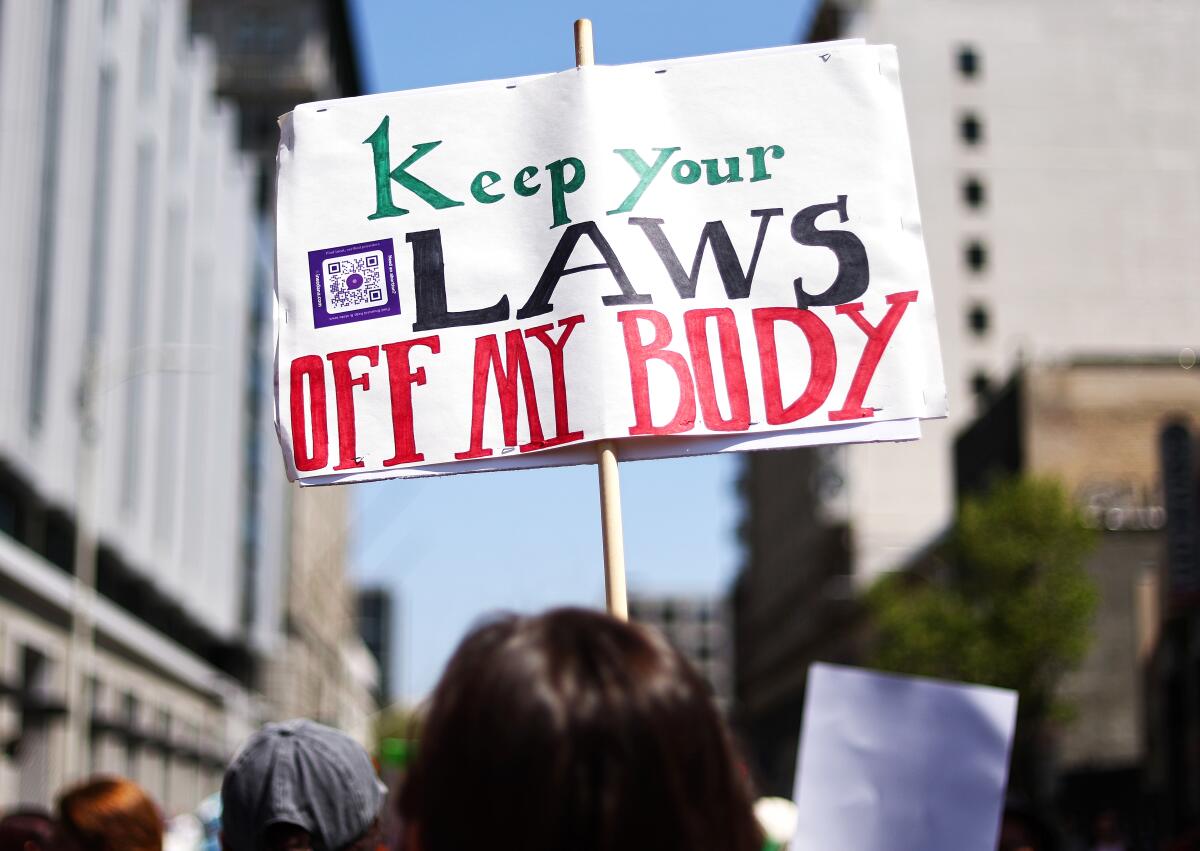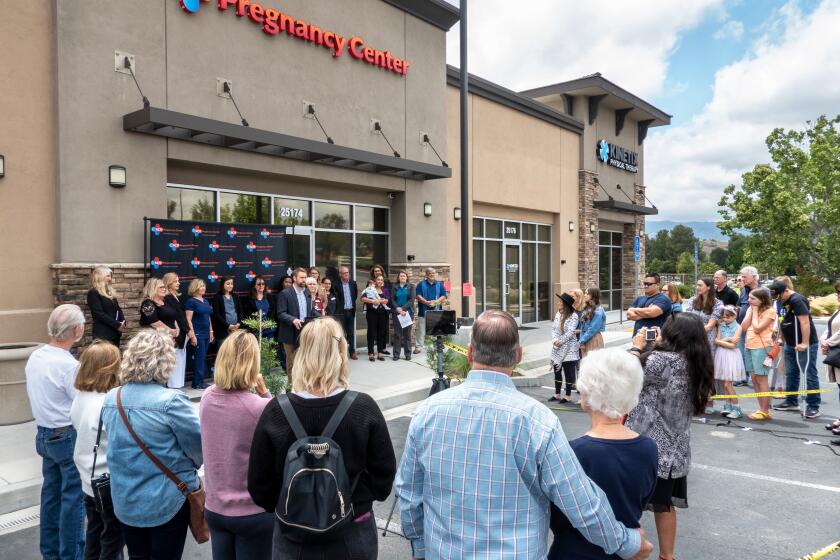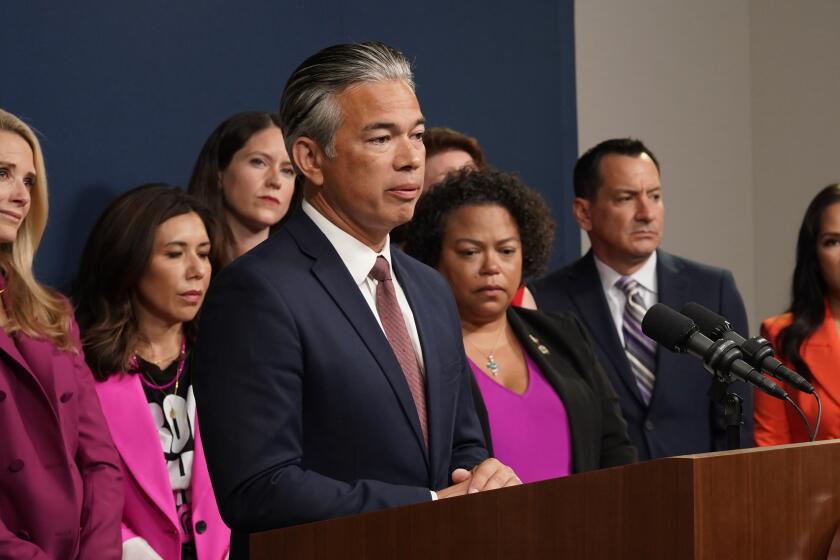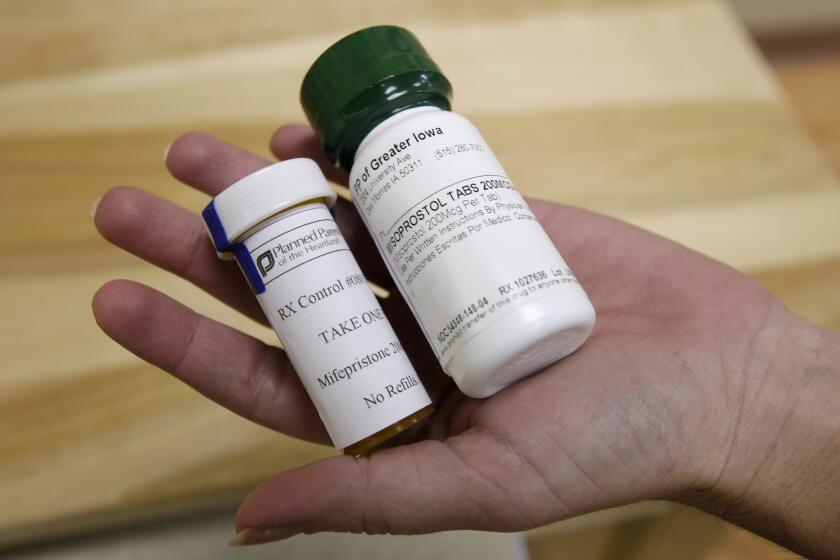How the end of Roe turned into a threat to American democracy

- Share via
A year ago, when the Supreme Court decided Dobbs vs. Jackson Women’s Health Organization, Justice Samuel A. Alito Jr. proclaimed the death of abortion rights to be a victory for American democracy, one that might de-escalate political conflict. A month ahead of this week’s Dobbs anniversary, Washington Post columnist George Will celebrated the court for restoring “abortion politics to the status of a state’s choice” — a move, Will argued, that has led to a “partial healing of the nation’s civic culture.”
But the idea that Dobbs is leading to any kind of healing ignores the reality on the ground in states, hospitals and courtrooms across the United States. Stories abound of people denied medical care and abortion bans threatening women’s lives. When Oklahoma’s Supreme Court required meaningful exceptions to the state’s bans, the court explained — in chilling detail — how close to death the Legislature could push a pregnant woman under the state’s constitution.
So far, the dominant response to Dobbs has been resistance, not healing.
Legislation aiming to regulate crisis pregnancy centers in California have failed despite otherwise robust abortion access policy.
Polls find that a majority of Americans oppose the Dobbs decision and that, not surprisingly, opposition to abortion bans has increased, in particular in places that already have them on the books. A June survey by Mississippi Today and Siena College shows that even among Mississippi’s Republican primary voters, a narrow majority supports repealing the state’s trigger law.
Voters favored abortion rights in all six of the ballot initiatives that have directly addressed the issue. Democrats fared far better than expected in what was supposed to be a red wave midterm election in 2022, partly thanks to the abortion issue and to the mobilization of younger, often female voters.
On closer examination, Dobbs never really embraced democracy in the first place, and especially not a robust, modern concept of democracy that guarantees equality and key liberties.
California joined law firms and advocacy groups to create a hotline that provides information and pro bono services for people who need abortion legal help.
The court set aside a right that most Americans have favored since the 1970s. Worse, the justices tied the Constitution’s meaning to an era when women were prohibited from voting or practicing law, and when the Comstock Act, a 19th century anti-vice law, was interpreted to prohibit the mailing of abortion or contraceptive drugs or devices, and to criminalize public discussion of controlling reproduction. The court’s holding that laws banning abortion in 1868 must define the nation’s history and tradition of liberty was a fig leaf for giving conservatives what they want.
Developments since Dobbs seem to support this understanding of the conservative agenda. There is little sign that the opponents of reproductive rights will accept the results of popular politics. In the year since Dobbs, we have seen legislative efforts to make it harder for citizens to put a question on the ballot — with some legislators acknowledging publicly or privately that their objective was to prevent voters from protecting abortion access. Notwithstanding the court’s suggestion that post-Dobbs, federal judges would be out of the abortion business, we’ve seen litigation designed to let federal judges override the Food and Drug Administration and eliminate access to mifepristone, used for medical abortions, nationwide.
But the most revealing symbol of the post-Dobbs era is the revival of the 19th century interpretation of the Comstock Act, which is central to the case challenging the FDA’s approval of mifepristone. In the 20th century, courts rejected a sweeping interpretation of the act and held that it prohibited the mailing of birth control or abortion drugs and devices only if intended for unlawful uses. Antiabortion attorneys general, judges and activists want to return to the earlier reading because it could help deliver what voters never would: a nationwide ban on abortion with no exceptions.
Editorial: The only thing certain about medication abortion is the confusion over how to get it
A federal appeals court has ruled that mifepristone, one of two drugs used in medication abortion, can remain on the market as a court case over whether it was properly approved by the FDA continues.
The Comstock Act has expressive as well as instrumental appeal for the antiabortion movement, especially abortion abolitionists. Its archaic interpretation reflected a particular idea of “sexual purity” that condemned women for separating sex and reproduction and for controlling the timing of motherhood. Today, the abolitionist movement supports draconian criminal penalties for women who have the procedure, even including the death penalty, and it doesn’t allow exceptions to abortion bans.
To date, abortion abolitionists have failed to capture control of the most powerful antiabortion groups, but the revived Comstock Act is compelling to a much larger group of abortion opponents — and not just for strategic reasons. It is not accidental the Dobbs decision was built on laws enacted in an era when women had few rights and little power to change the law. A 2022 national survey showed that those opposed to abortion tend to have a traditional understanding of gender roles and that stereotypical beliefs about women in general and women who have had abortions in particular are strong predictors of opposition to abortion — stronger even than party identification, gender or religiosity.
Through its reimagined version of the Comstock Act, the right wing seeks to enforce a traditional view of women and their roles, sexual purity and societal control over reproduction, a view that limits what people can say and think, as well as what they can do. In the era of “Don’t Say Gay” mandates and book bans, its reemergence tells us a great deal about what kind of democracy some of Dobbs’ proponents have in mind for the years to come.
Mary Ziegler is a law professor at UC Davis and the author of “Roe: The History of a National Obsession.” Reva Siegel is a law professor at Yale University and the author of the Texas Law Review article “Memory Games: Dobbs’s Originalism as Anti-Democratic Living Constitutionalism — and Some Pathways for Resistance.”
More to Read
A cure for the common opinion
Get thought-provoking perspectives with our weekly newsletter.
You may occasionally receive promotional content from the Los Angeles Times.












